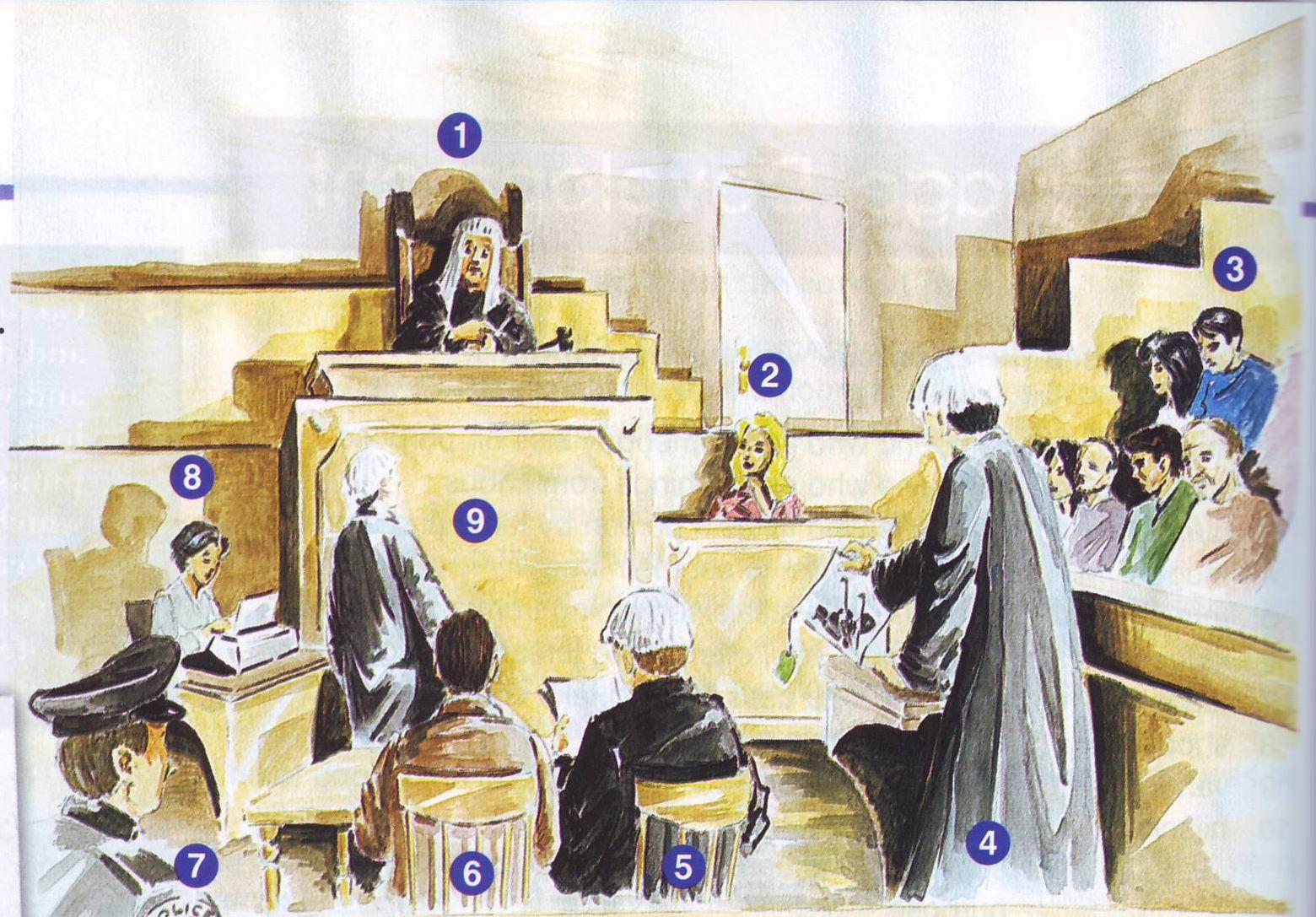
- •1 Semester Unit 1. Types of legal professions in Britain.
- •Law and Order
- •The Nature of Legal Profession
- •1. The accused 2. Court reporter 3. Witness 4. Policeman 5. Jury
- •6. Judge 7. Defence lawyer 8. Prosecutor 9. Junior defence lawyer
- •Judiciary of England and Wales
- •Unit 2. The system of court in Britain.
- •The court system
- •Unit 3. Classifications of crimes.
- •Crimes and criminals
- •Offences
- •Punishment
- •Classification of crimes What are crimes?
- •How are crimes classified?
- •1. Felonies
- •2 Misdemeanors
- •What are business related crimes?
- •1. Larceny
- •The Blasphemous Teddy Bear
- •Unit 4. A Famous criminal.
- •Jack the Ripper
- •Andrei Chikatilo, 1936 – 1994 (The Rostov Ripper)
- •Osama Bin Laden (b. 1957)
- •From Russia, With Love a Moscow jury found Alexander Pichushkin – chessboard killer – guilty of 48 murders.
1. The accused 2. Court reporter 3. Witness 4. Policeman 5. Jury
6. Judge 7. Defence lawyer 8. Prosecutor 9. Junior defence lawyer
a) somebody who has been charged with committing a crime
b) a professional who decides how a criminal should be punished
c) a professional who speaks for the accused and advises him/her in court
d) somebody who has seen a crime happen
e) a professional who assists the lawyer of the accused
f) a group of people in court who decide whether somebody is innocent or guilty
g) somebody whose job is to deter people from committing crimes and to arrest those who break the law
h) a professional who represents the state in court
i) somebody who notes down what is said in court

Exercise 11. Fill in with: accused, evidence, convicted, sentenced, tried, arrested, guilty, put, suspected
The police had 1)…….. Paul Williams for months, and when they finally gathered some real 2)……….. against him he was 3)………by the police and 4)…………of trafficking in drugs. A few weeks later he was 5)……….. for the crime. The jury were quickly convinced that he was 6)……..of drug-trafficking, so he was 7)………of the crime and 8)………..to ten years in prison. The police were satisfied they had managed to 9)…………such a dangerous criminal behind bars.
Exercise 12. Read and translate the text.
Judiciary of England and Wales
There are various levels of judiciary in England and Wales – different types of courts have different styles of judges. They also form a strict hierarchy of importance, in line with the order of the courts in which they sit, so that judges of the Court of Appeal of England and Wales are generally given more weight than district judges sitting in County Courts and Magistrates.
By statute, judges are guaranteed continuing judicial independence.
The following is a list of the various types of judges who sit in the Courts of England and Wales:
1. Lord Chief Justice and Lord Chancellor
2. Justices of the Supreme Court
3. Court of Appeal
4. High Court
5. Circuit Judges
6. Recorders
7. District Judges
8. Magistrates
Since 3 April 2006 the Lord Chief Justice has been the overall head of the judiciary. The Lord Chief Justice is also the head of the Criminal Division of the Court of Appeal. Although the Lord Chancellor is no longer a judge, he still exercises disciplinary authority over the judges, jointly with the Lord Chief Justice. He also has a role in appointing judges. In court, the Lord Chief Justice wears a black damask gown with gold lace along with a short wig during criminal cases and the black civil gown with gold tabs during civil cases. The Lord Chancellor simply wears the black damask gown with gold lace and full wig during ceremonial occasions.
The judges of the Supreme Court of the United Kingdom are known as Justices of the Supreme Court, and they are also Privy Counsellors.
Judges of the Court of Appeal are known as Lord Justices, and they too are Privy Counsellors. Formerly, Lord Justices of Appeal could only be drawn from barristers of at least 10 years’ standing. In practice, much greater experience was necessary but now a potential Lord Justice of Appeal must satisfy the judicial-appointment eligibility condition on a 7-year basis.
A Recorder is a part-time circuit judge, usually a practicing barrister or solicitor.
Magistrates are Laymen drawn from the community who generally sit in threes in order to give judgment in Magistrates’ Courts and Youth Courts.
A coroner or forensics examiner is an official chiefly responsible for investigating deaths, particularly some of those happening under unusual circumstances, and determining the cause of death. To become a coroner in England and Wales the applicant must have a degree in a medical or legal field, e.g. criminology, bio-medical sciences. Generally, coroners have had a previous career as a lawyer (solicitor/barrister) or doctor of at least five years standing. The coroner’s jurisdiction is limited to finding the name of the deceased and the cause of death. When the death was unexpected, violent or unnatural, the coroner will decide whether to hold a post-mortem and, if necessary, an inquest.
